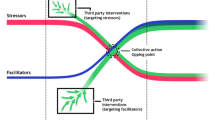Abstract
The ‘policy communities’ literature has stood the test of time because it describes a ‘universal’ logic for groups and governments to interact. To deal with complex government, policymakers divide their responsibilities into manageable units, and delegate responsibility for policymaking to bureaucrats, who form relationships with the groups from which they seek information and advice. Governments come and go, and these relationships vary from issue to issue, but the logic of consultation does not change. In this article, we describe this process, situate it within a broader discussion of policy theory, and use these insights to respond to the points made by Marsh and McCaffrie.
Similar content being viewed by others
Notes
Of course, in practice, what we call ‘universal’ is based on the study of a small number of ‘Western’ countries – including the United States and the United Kingdom – but many concepts can be given this label because they refer to logics of policymaking, or to the limits of cognitive behaviour.
References
Bevir, M. and Rhodes, R.A.W. (2003) Interpreting British Governance. London: Routledge.
Burch, M. and Holliday, I. (1996) The British Cabinet System. London: Prentice Hall.
Cairney, P. (2015) What is complex government and what can we do about it? Public Money and Management 35 (1): 3–6.
Cairney, P. and Heikkila, T. (2014) A comparison of theories of the policy process. In: P. Sabatier and C. Weible (eds.) Theories of the Policy Process, 3rd edn. Chicago, IL: Westview Press.
Cairney, P. and Weible, C. (2015) Comparing and contrasting Peter Hall’s paradigms and ideas with the advocacy coalition framework. In: M. Howlett and J. Hogan (eds.) Policy Paradigms in Theory and Practice. Basingstoke, UK: Palgrave Macmillan.
Cairney, P., Studlar, D. and Mamudu, H. (2012) Global Tobacco Control: Power, Policy, Governance and Transfer. Basingstoke, UK: Palgrave Macmillan.
Geyer, R. (2012) Can complexity move UK policy beyond ‘evidence-based policy making’ and the ‘audit culture’? Political Studies 60 (1): 20–43.
Hall, P. (1993) Policy paradigms, social learning, and the state: The case of economic policymaking in Britain. Comparative Politics 25 (3): 275–296.
Heclo, H. (1978) Issue networks and the executive establishment. In: A. King (ed.) The New American Political System. Washington DC: American Enterprise Institute.
John, P. (2003) Is there life after policy streams, advocacy coalitions, and punctuations: Using evolutionary theory to explain policy change? The Policy Studies Journal 31 (4): 481–498.
Jordan, G. (1981) Iron triangles. Woolly corporatism and elastic nets. Journal of Public Policy 1 (1): 95–123.
Jordan, G. and Cairney, P. (2013) What is the ‘dominant model’ of British policy making? Comparing majoritarian and policy community ideas. British Politics 8 (3): 233–259.
Jordan, G., Halpin, D. and Maloney, W. (2004) Defining interests: Disambiguation and the need for new distinctions? The British Journal of Politics & International Relations 6 (2): 195–212.
Kahneman, D. (2012) Thinking Fast and Slow, UK edn. London: Penguin.
Kingdon, J. (1984) Agendas, Alternatives and Public Policies, 1st edn. New York: Harper Collins.
Majone, G. (1989) Evidence, Argument and Persuasion in the Policy Process. New Haven, CT: Yale University Press.
Marsh, D. and McCaffrie, B. (2015) One cheer for Jordan and Cairney: Taking the governance literature seriously. British Politics, forthcoming.
Marsh, D. and Rhodes, R.A.W. (eds.) (1992) Implementing Thatcherite Policies. Buckingham, UK: Open University Press.
Ostrom, E., Cox, M. and Schlager, E. (2014) Institutional rational choice. In: P. Sabatier and C. Weible (eds.) Theories of the Policy Process, 3rd edn, Boulder, Colorado: Westview Press.
Richards, D. and Smith, M. (2004) The ‘hybrid state’. In: S. Ludlam and M. Smith (eds.) Governing as New Labour. London: Palgrave Macmillan.
Room, G. (2015) Complexity, power and policy. In: R. Geyer and P. Cairney (eds.) Handbook on Complexity and Public Policy. Cheltenham, UK: Edward Elgar.
Rose, R. (1990) Inheritance before choice in public policy. Journal of Theoretical Politics 2 (3): 263–291.
Simon, H. (1976) Administrative Behavior, 3rd edn. London: Palgrave Macmillan.
Toke, D. and Nielsen, H.O. (2015) Policy consultation and political styles: Renewable energy consultations in the UK and Denmark. British Politics, Forthcoming.
Weible, C. (2014) Introduction. In: P. Sabatier and C. Weible (eds.) Theories of the Policy Process, 3rd edn, Boulder, Colorado: Westview Press.
Author information
Authors and Affiliations
Corresponding author
Rights and permissions
About this article
Cite this article
Cairney, P., Jordan, G. Theories of the policy process: What is British and what is universal? A polite reply to Marsh and McCaffrie. Br Polit 10, 486–492 (2015). https://doi.org/10.1057/bp.2015.32
Published:
Issue Date:
DOI: https://doi.org/10.1057/bp.2015.32




